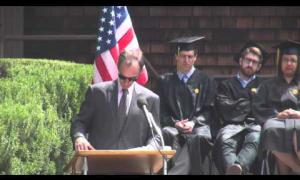On The Need for a Bipartisan Foreign Policy
February 27, 2012
And that’s what I’d like to talk about tonight. I’d like to share with you some thoughts on the value of a bipartisan foreign policy, how the heated politics of our era have led too many, too often, to lay that tradition aside, and how we can restore that bipartisan legacy.
Our democratic system not only allows for, it requires, vigorous debate. The line between tough debate and partisan sniping can be a faint line. But there is a line, and it’s an important line. And we can see that in the life and career of one of the architects of America’s post-World War II foreign policy, one of my predecessors from Michigan: Senator Arthur Vandenberg. Vandenberg, a Republican who worked closely with two Democratic presidents, described bipartisanship in foreign policy as follows:
“a mutual effort, under our indispensable two-Party system, to unite our official voice at the water’s edge so that America speaks with maximum authority against those who would divide and conquer us and the free world. It does not involve the remotest surrender of free debate in determining our position. On the contrary, frank cooperation and free debate are indispensable to ultimate unity. In a word, it simply seeks national security ahead of partisan advantage.”
National security ahead of partisan advantage. That should be our goal.
As Vandenberg said, this definition does not preclude vigorous debate—in fact it demands it. On my visits to speak to our troops in Iraq, my message to them was that we owe those who defend our nation not only the best weapons, the best training and the best support we can provide, but also our best ideas—and that means we owe them spirited, principled debate so the best ideas to advance our security can emerge. I told them that I argued vigorously against sending them there, but once they were there, I would argue just as vigorously to make sure they had what they needed to succeed in their mission, and that they were fighting not just to protect freedom to debate in our country, but to make it available to others.
So while we will not forego tough, contentious public discussion, even controversy, the challenges we face are too pressing, too complex and too important for us to let the question “How can this help in the next election?” cloud our answers to the question, “What is the best policy for our nation?”
The current political and media environment, however, provides powerful incentives to leave nuance and reason behind in favor of partisan vitriol. An increasingly fragmented media, scrambling to hold onto readers, viewers and advertisers, is more and more focused on highlighting the extremes of our public discourse. Where there once were a handful of national newspapers, a local paper, a few television and radio networks, and a few major national news magazines, there are now also 200 cable channels, thousands of blogs and websites, and millions of people on Twitter, all in a 24/7 battle for a slice of audience.
What too many of these outlets offer is simplistic attacks and bombast –not a principled conflict of ideas, but a personalized, partisan contest where scoring points means not offering the best solutions, but winning the day’s news cycle. Too many public figures see that the best way to attract notice is to feed the media’s appetite for the extreme.
The result has been a fraying of the fabric that has kept us together for so long on national security issues despite our partisan loyalties or ideological leanings.
We are all vulnerable to the temptation to score partisan points. In the heat of debate over contentious issues, I can probably think of a time or two when I veered across the line that divides sharp debate from partisanship. If I can’t recall, I’m sure Senator McCain could help jog my memory.
So how do we repair this frayed fabric? I believe we will find lessons in history, and opportunities to put those lessons into practice by addressing perhaps the biggest challenge we now face.
As you know, the Budget Control Act that Congress passed last year required us to find at least $1.2 trillion in deficit reduction over 10 years. Unless we act, we face draconian across-the-board cuts to both domestic and security programs, cuts that set no priorities, that make no hard choices. Our country cannot afford to allow those cuts to take place. The potential cuts to defense that would result from sequestration are a threat to our national security. And the domestic cuts would do terrible damage to education, health care and much more. There is strong bipartisan agreement that these automatic cuts cannot stand. There is a huge inclination in both parties to find a solution.
But any solution must be bipartisan, and a bipartisan solution will require compromises from both parties. My party will have to accept the reality that prudent, rational spending cuts, including a reining in of entitlements, must be part of that solution. That is going to be a difficult step for many in my party to take. But we have a powerful historical example to follow in the accomplishment of Senators Dole and Moynihan, a Republican and a Democrat, in the early 1980s to rescue Social Security when it was on the brink of collapse. Working together with other members of the Greenspan Commission who were willing to put national welfare above partisan interests, they crafted a solution that required everyone to give up a little in order to produce a larger good.
Just as Democrats must face unpleasant facts, our Republican colleagues will have to accept the reality that the bipartisan solution to our budget situation must include revenue. Over the last decade or longer, we have allowed federal revenue to slide to its lowest level as a percentage of our economy in generations. We simply cannot protect important priorities unless we restore some of that lost revenue. The president’s budget offers $3 trillion in deficit reduction—more than enough to remove the threat of the automatic cuts. It includes a roughly equal amount of spending cuts and revenue increases. In this, he joins a long line of presidents, Democratic and Republican, from President Reagan to the first President Bush to President Clinton, who adopted deficit reduction plans that included both significant added revenue and spending cuts.
I believe both parties, Democrats and Republicans, will accept these very difficult realities, because the alternative—these draconian automatic cuts—are just too damaging to the country. Others before us have succeeded when the challenges were even greater.
In January of 1945, as World War II moved to an end, Senator Vandenberg came to the Senate floor to declare that America was at a critical moment. Conflicts among the allies who had fought the war, and within our own nation about how to deal with the post-war landscape, threatened to sow dangerous divisions.
Vandenberg’s prescriptions were simple. “No man in his right senses will be dogmatic in his viewpoint at such an hour,” he said. “Each of us can only speak according to his little lights—and pray for a composite wisdom that shall lead us to high, safe ground.”
Now Vandenberg and his peers achieved that that openness to the ideas of others, that “composite wisdom.” He led Republicans to work with Democrats in crafting the Marshall Plan and the Atlantic Charter, helping bring future peace to a war-torn world.
We can learn from their example. We can do so with the support and vigilance of institutions such as CNI, whose hallmark and whose influence is not just a thread of realism in foreign policy but one of civility and respect for the immense significance of the issues we face as we seek to weave that thread. This room is filled with men and women who have done just that. I thank you for that, for the contributions you have made to our nation, and for your recognition tonight.




